Much has been noted of the presence of the Islamic State in Raqqa province, where the group controls all major urban localities (Raqqa city, Tabqa, Ma'adan, and Tel Abyad), as well as the Kurdish militias just west of Tel Abyad, from which town they were expelled back in August 2013 on account of cooperation between the Islamic State, Ahrar ash-Sham and other local rebels who have since been subdued by the Islamic State. What then of other groups? Broadly, we can distinguish two kinds: pro-regime forces, and a small rebel insurgency fighting against the Islamic State. They are detailed below. Note that I exclude Jabhat al-Nusra as a separate group here because the history of the group's presence has been sufficiently well documented before.
Regime
National Defense Force (NDF)- Raqqa

NDF Raqqa Emblem
The NDF is officially a 'counter-insurgency' force trained with the help of the Iranian Revolutionary Guards Corp and Hezbollah to deal with the problem of lack of regime manpower in the regular armed forces as opposed to the wider insurgency. The NDF has become a meaningful force in the regime's arsenal but it is not of the same nature everywhere in Syria. Out in Raqqa province, where the regime presence has been reduced to little more than isolated military bases, the NDF is more of a banner for underground remnant loyalists operating covertly in the province (in so far as it is a meaningful entity within Raqqa province itself), though NDF Raqqa has also claimed under its banneroperations on the Raqqa-Salamiya/Raqqa-Athariya roads stretching into the Hama countryside to the southwest.
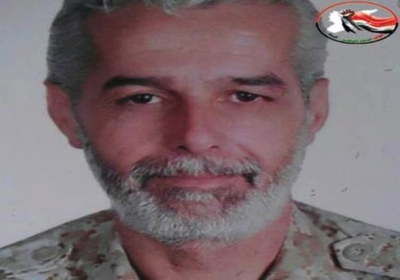
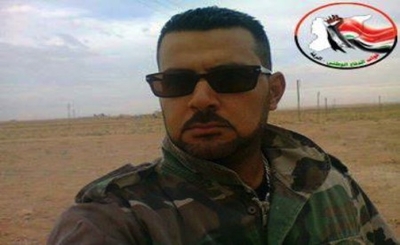
Mundhar Sharif al-Mousa and Fadi Sheikhan, identified with NDF Raqqa and said to have been killed in an ambush on the Athariya road.
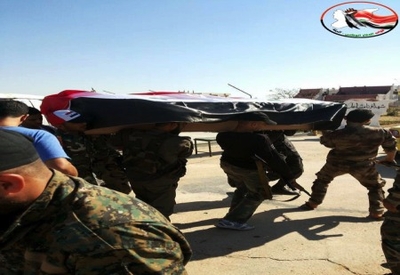
Funeral for the two men.

A photo said to have been taken "with the lens of the NDF lions in eastern Raqqa countryside: photo of the Shari'a court in al-Karama." This would seem to corroborate the idea of NDF Raqqa as a banner for the regime loyalist underground.

Pro-regime graffiti in Raqqa in February 2014: "National Defense to liberate Raqqa."
NDF Raqqa's other main function has been reporting the latest news on the clashes between the Islamic State and regime forces in the Division 17 military base area. Division 17 has been the subject of some contention on the question of the relationship between the Islamic State and the regime. Some critics argue that the Islamic State has not (at least until now) attacked Division 17 or that any signs of fighting were merely for show rather like the naval battles on the Tiber of the days of the early Principate.
Neither of these assertions stands up to scrutiny, though it is certainly fair to argue that the Islamic State did not devote as much manpower and resources to taking the base as it is doing now on account of infighting with other rebels elsewhere in Syria. In any case, the clashes that did take place were meaningful and happened on multiple occasions, corroborated by reporting on all sides (Islamic State provincial news feeds, Raqqa pro-regime news networks, and local activists like Abu Ibrahim al-Raqqawi; cf. video footageshared by non-Islamic State sources), resulting in casualties.

Qasi Fu'ad Azzam, a Druze soldier killed in clashes in the Division 17 area with the Islamic State on 16 March 2014.

Abu Aamer al-Ansari, an Islamic State fighter killed in Division 17 clashes. Death announced in March.
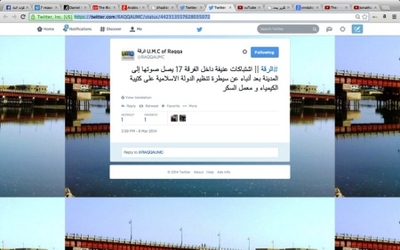
Non-Islamic State source on "violent clashes" in March 2014 between the regime and the Islamic State in Division 17 area, such that they could be heard from Raqqa city.
The most recent fighting, as I noted above, has been more intense, as reporting from both sides makes clear.

Abu Abd al-Rahman al-Iraqi poses with heads of decapitated regime soldiers from Division 17 base.
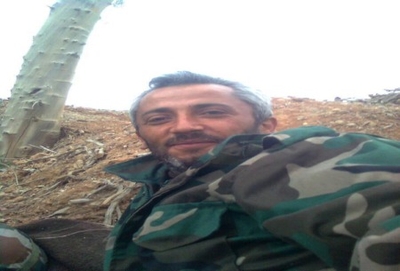
Ahmad Ali Ibrahim, killed in the latest Islamic State assault on Division 17.

Brigadier General Hasham al-Sha'arani, a Druze army officer killed in the latest round of Division 17 clashes. Cf. List of those wounded subsequently taken to Latakia hospital.
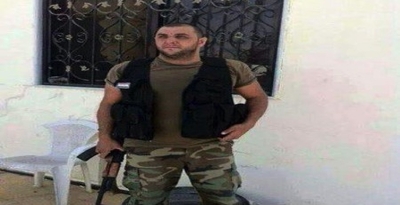
Muhannad Sari' Suleiman, originally from Jobat Burghal (Latakia province), killed in Division 17 clashes.
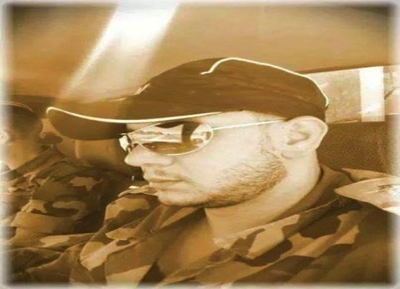
Majid Ahmad al-Hassan, originally from the Alawite quarter of Zahara' in Homs, also killed in the Division 17 clashes.
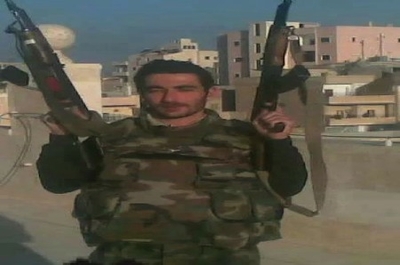
Suleiman Ibrahim, originally from Tartous area, killed in Division 17 clashes.
Saraya Ansar al-Jaysh al-Arabi al-Suri

Statement by Saraya Ansar al-Jaysh al-Arabi al-Suri in Raqqa.
This purported group- translating to "Brigades of Supporters of the Syrian Arab Army"- is like the NDF Raqqa a banner for underground regime loyalists in Raqqa. In fact, the group's Facebook page now simply uses the NDF Raqqa banner, indicating no real difference between these banners. The video statement above is merely of interest for echoing of regime rhetoric talking points, decrying the overrunning of Raqqa by foreign fighters from the Islamic State (not exactly divorced from reality, though), affirming that "Islam" has nothing to do with the Islamic State's actions, that true jihad comes in the path of liberating Palestine, and attacking the "petro-dollar" sheikhs of the Gulf. The statement recalls one issued by underground loyalists in the immediate aftermath of the fall of Raqqa city, in which there was a vow to wage "true jihad" in the fight against the rebels who had taken over the city.
Rebels
Liwa Thuwar Raqqa

Emblem of Liwa Thuwar Raqqa
Liwa Thuwar Raqqa- translating to "The Revolutionaries of Raqqa Brigade"- is an FSA-banner group in origin that became affiliated with Jabhat al-Nusra- as did many other similar rebel groups following Jabhat al-Nusra's announcement of its "return" to Raqqa city in September 2013- in a bid last year to protect itself from the growing influence of the Islamic State in Raqqa. Led by one "Abu Eisa," the group, according to Abu Ibrahim al-Raqqawi, became independent from Jabhat al-Nusra at the beginning of this year with the outbreak of infighting between the Islamic State and other rebels within Raqqa city. However, it should be noted that only much later this year (April) did Jabhat al-Nusra issue an official statement on the separation of Liwa Thuwar Raqqa:
"More than 6 months ago Liwa Thuwar Raqqa joined us in the city of Raqqa, and they had shown their readiness to submit to Shari'a sessions and discipline with precepts approved by Jabhat al-Nusra.
But there was deficiency on the part of both sides in the implementation of this agreement. From the side of Jabhat al-Nusra: the deficiency was in the holding of Shari'a sessions as regards quantity and manner.
From the side of Liwa Thuwar Raqqa: the deficiency was in the lack of embrace of the precepts approved by Jabhat al-Nusra. And after the attacks of the group of the state [Islamic State] on the factions waging jihad and the beginning of the infighting, the Liwa withdrew from Raqqa to some of the neighboring areas, and the organizational link was cut off from that day. Thus, Jabhat al-Nusra announces the dissolution of any organizational connection between us and Liwa Thuwar Raqqa...16 April 2014."
This issue regarding Liwa Thuwar Raqqa and its relationship with Jabhat al-Nusra has some implications and lessons. The first of these is that integration into Jabhat al-Nusra is no light matter: on the contrary, assimilation of the ideology is expected in the end, and all the more so now with the establishment of the Islamic Emirate project.
Second, there is a degree of spin in the Jabhat al-Nusra statement here: Liwa Thuwar Raqqa and other FSA-banner origin battalions that pledged allegiance in a bid to protect themselves from the Islamic State. In January, a statement emerged purportedly in Jabhat al-Nusra's name declaring operations against the Islamic State in Raqqa.
This statement was then disavowed by Jabhat al-Nusra's central leadership; it had emerged from a Facebook page calling itself kamātu l-Raqqa, which featured local rebels who had joined Jabhat al-Nusra following the 'return' to Raqqa city. In this context we should deem Liwa Thuwar Raqqa and allies of similar disposition as likely responsible for the psy-ops statement in Jabhat al-Nusra's name.
One should also note that the Jabhat al-Nusra's statement partly came in response to a narrative promoted by Islamic State supporters that because Liwa Thuwar Raqqa has been coordinating with the Kurdish YPG (in the form of the Jabhat al-Akrad front group) in the remnant northern Raqqa countryside insurgency against the Islamic State (primarily west of Tel Abyad), therefore Jabhat al-Nusra was supposedly in an alliance with the "PKK apostates" and therefore guilty of apostasy itself.
This parallels the Islamic State supporters' narrative indicting Jabhat al-Nusra as apostates (and note, in practice this takfir approach was adopted on the ground) on account of alleged coordination with the SMC in Deir az-Zor province. To date, while there have indeed been local ceasefires between Jabhat al-Nusra and the YPG, nothing suggests a vindication of the pro-Islamic State claims of an actual military alliance.
As of now, Liwa Thuwar Raqqa continues to exist but has been unable to score any significant victories against the Islamic State, only capturing some small villages west of Tel Abyad of no great importance and liable to change hands. The group appointed a new official spokesman in June but there are little signs of meaningful progress.
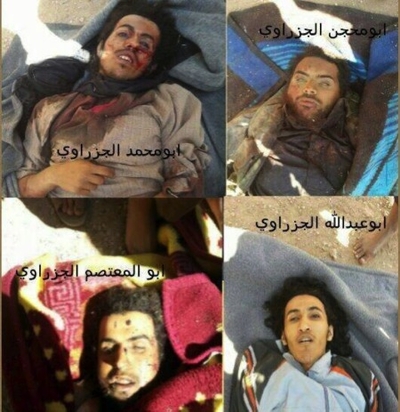
Four al-Jazrawis (foreign fighters from the Arabian Peninsula, normally Saudi Arabia) of the Islamic State killed by Liwa Thuwar Raqqa in May 2014.
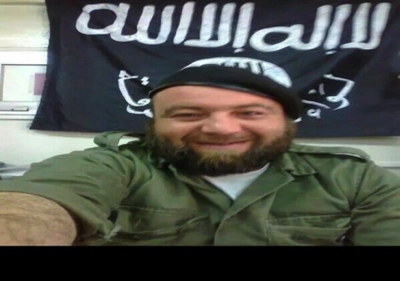
Abu Dhiyab, a Liwa Thuwar Raqqa commander killed by the Islamic State. Note the banner behind him echoes the Islamic State's "Banner of Tawhid" (more recently in the group's messaging, the "Banner of Khilafa"). Since the flag's symbols of the first half of the shahada followed by the Prophet's seal are not automatically associated with the Islamic State, some of the group's rivals have taken up the banner in an attempt to 'reclaim' it from the Islamic State. A similar example in Raqqa province was the independent Liwa Owais al-Qarni that was based in Tabqa and refused to fight the Islamic State, thus reducing itself to subordination to the latter. Following an apparent prison break of regime-aligned prisoners in March, the Islamic State forcibly disbanded Liwa Owais al-Qarni.

Corollary to the above: a Northern Storm fighter (now deceased) and an activist who was detained by the Islamic State in Azaz last year hold up a 'banner of Tawheed' with "Northern Storm Brigade" inscribed on it. Some of the Azaz Facebook activist pages had this banner too (minus the Northern Storm inscription). Though I had been skeptical at the time of the idea that featuring such a banner did not mean not supporting the Islamic State, this image made me rethink what was at play. Presently, Northern Storm identifies with the Islamic Front, despite tensions with Liwa al-Tawheedover the Bab al-Salama border area and even as many ex-members remain with the Islamic State.
Liwa al-Jihad fi Sabeel Allah

Emblem of Liwa al-Jihad fi Sabeel Allah.
This group, translating to "Jihad in the Path of God Brigade" is an FSA-banner formation that works closely with Liwa Thuwar Raqqa, though unlike Liwa Thuwar Raqqa, it explicitly acknowledges the opposition-in-exile government and the Hay'at al-Arkan (SMC), at least according to a recent interview with the group's official spokesman. The evidence for the close alliance and ground coordination is as follows: firstly, the group has issued a joint statement with Liwa Thuwar Raqqa, and secondly, areas of operation coincide. Though both groups primarily operate in Raqqa province countryside, they have also clashed with the Islamic State in the rural hinterlands of eastern Aleppo province, such as in the Manbij area.
This also includes coordination with the wider Euphrates Islamic Liberation Front I have mentioned previously- a coalition now severely decimated by the conflict with the Islamic State- and an assortment of other minor FSA-banner underground insurgent groups operating against the Islamic State in eastern Aleppo province.
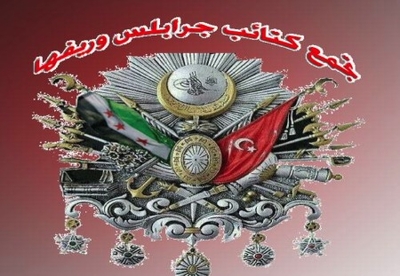
An example of one of the underground FSA-banner insurgent groups in eastern Aleppo area working with Liwa Thuwar Raqqa and Liwa al-Jihad fi Sabeel Allah: "Group of Battalions Jarabulus and its Countryside." The presence of the Turkish flag is noteworthy, as many of the supporters of these groups coordinating media activities and arranging for financial support are currently in Turkey. Further, Ankara, in fear of an Islamic State attack on its own territory, is likely supporting these groups in the hope of rolling back the Islamic State. At the beginning of July, this group, Liwa Thuwar Raqqa, Liwa al-Jihad and others appealed to the opposition-in-exile and Hay'at al-Arkan for reinforcements.
What kind of underground insurgent attacks take place? Besides armed clashes and mortar strikes, there are also IED bombings. Very rare inside the Islamic State's urban centers in Raqqa province, they occur occasionally in the hinterlands. There is too little to demonstrate that these attacks are significantly damaging the Islamic State administrative and security apparatus in Raqqa province.
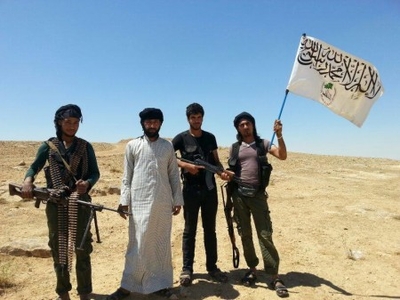
Purported leader of Liwa al-Jihad fi Sabeel Allah (Abu Wael) with some members in Ayn Issa countryside, Raqqa province.
Ahrar ash-Sham [defunct]
I mention Ahrar ash-Sham for the sake of completeness, despite the fact that it is defunct in Raqqa province. For example, though media reports last autumn gave the impression that Raqqa city had become solely controlled by the Islamic State, the fact is that there were still Jabhat al-Nusra and Ahrar ash-Sham in the city, the latter of which had been a major participant in the original fall of the urban center in March 2013.
It would be fair though to liken Raqqa city by autumn 2013 to a triumvirate, in which the Islamic State was the strongest actor and ever growing in power. Ahrar ash-Sham was also present in other Raqqa province localities, most notably controlling the Tel Abyad border gates until being expelled by the Islamic State in January 2014.
A key strategic error- in my view- on the part of Ahrar ash-Sham as regards its relations with the Islamic State in Raqqa province was its willingness to work with the Islamic State or stand aside as other actors viewed as real or potential rivals were fought or expelled by the Islamic State: namely, the Kurdish militias and Ahfad al-Rasul respectively.
The latter was expelled from Raqqa city in August by the Islamic State, while Ahrar ash-Sham did nothing. Kurdish militias suffered some heavy losses on account of coordination between Ahrar ash-Sham and the Islamic State, most notably being expelled from Tel Abyad city in August 2013 as I mentioned in the preface. Indeed, Ahrar ash-Sham issued multiple statements oncoordination with other factions in Raqqa province against Kurdish forces, all of which had followed on from wider infighting that broke out after the YPG had expelled the Islamic State from Ras al-Ayn. Thus, other rebel groups had essentially thrown in their lot with the Islamic State.
One final point of interest as regards the former Ahrar ash-Sham presence in Raqqa is the group's da'wah outreach activities, which, like the Islamic State, encompassed local children. Note the two images below for comparison.

Ahrar ash-Sham Raqqa da'wah outreach: October 2013.
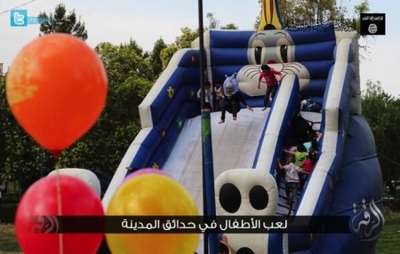
Islamic State advertising a slide for children: May 2014.
Though parts of the slides are obscured in both images, the two look uncannily similar. It is certainly possible that the Islamic State seized the slide and other outreach assets for children from Ahrar ash-Sham following the latter's expulsion from Raqqa city in January 2014. In any event, like the Islamic State, Ahrar ash-Sham da'wah outreach in Raqqa also involved Qur'an learning and memorization circles.
Conclusion
Raqqa province as a whole offers a fairly bleak picture for those who might hope for the Islamic State's rivals in the province to pose a real challenge to the group's monopoly on control, foremost because the Islamic State's rivals lack manpower to carry out sustainable offensives, which would be so even if the regime and rebels in the province decided to partner up (highly unlikely, of course). Regime forces south of Tabqa had tried to exploit an opening in May while the Islamic State was dealing with localized gains by Liwa Thuwar Raqqa and other rebels in the northern countryside, but little ultimately materialized of it. Short of an outside actor carrying out an actual ground military intervention (perhaps by Turkey as the most viable actor?), one can only hope for dissension within the Islamic State's ranks and collapse from internecine strife both now and the foreseeable future.

